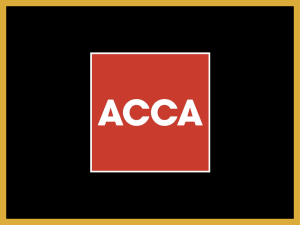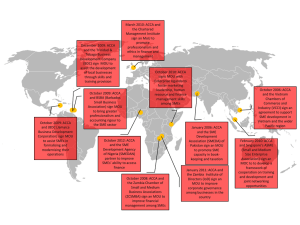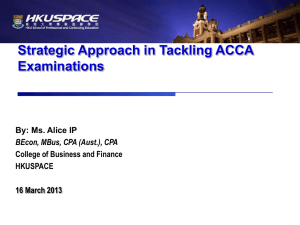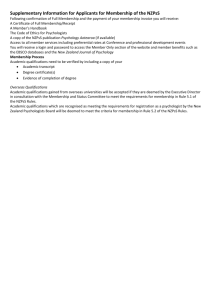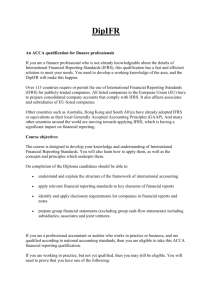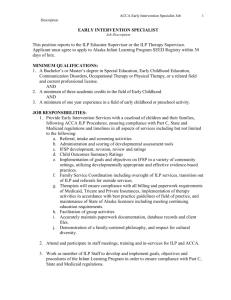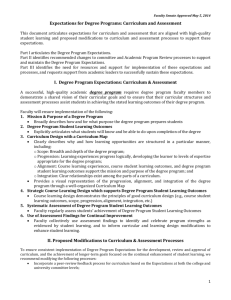INTRODUCTION TO RECOGNITION
advertisement
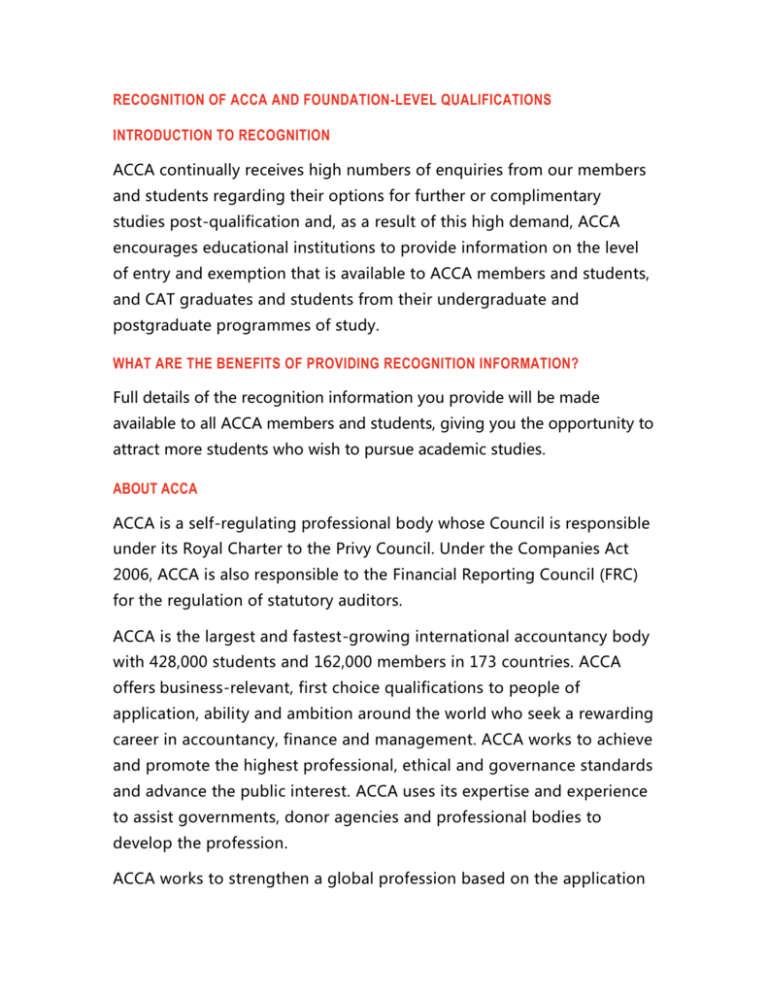
RECOGNITION OF ACCA AND FOUNDATION-LEVEL QUALIFICATIONS INTRODUCTION TO RECOGNITION ACCA continually receives high numbers of enquiries from our members and students regarding their options for further or complimentary studies post-qualification and, as a result of this high demand, ACCA encourages educational institutions to provide information on the level of entry and exemption that is available to ACCA members and students, and CAT graduates and students from their undergraduate and postgraduate programmes of study. WHAT ARE THE BENEFITS OF PROVIDING RECOGNITION INFORMATION? Full details of the recognition information you provide will be made available to all ACCA members and students, giving you the opportunity to attract more students who wish to pursue academic studies. ABOUT ACCA ACCA is a self-regulating professional body whose Council is responsible under its Royal Charter to the Privy Council. Under the Companies Act 2006, ACCA is also responsible to the Financial Reporting Council (FRC) for the regulation of statutory auditors. ACCA is the largest and fastest-growing international accountancy body with 428,000 students and 162,000 members in 173 countries. ACCA offers business-relevant, first choice qualifications to people of application, ability and ambition around the world who seek a rewarding career in accountancy, finance and management. ACCA works to achieve and promote the highest professional, ethical and governance standards and advance the public interest. ACCA uses its expertise and experience to assist governments, donor agencies and professional bodies to develop the profession. ACCA works to strengthen a global profession based on the application of consistent standards, which we believe best supports international business and the desire of talented people to have successful, international careers. We champion the needs of small and medium sized business (SMEs) and emerging economies, and promote the value of sustainable business. To achieve this we work with global bodies such as the International Federation of Accountants (IFAC) and with more than 80 global accountancy partnerships. Above all, we seek to bring long-term value to economies in which we develop and support professional accountants. We support our 162,000 members and 428,000 students in 173 countries, helping them to develop successful careers in accounting and business, with the skills needed by employers. We work through a network of 89 offices and centres and more than 8,500 Approved Employers worldwide, who provide high standards of employee learning and development. ACCA works in the public interest, assuring that its members are appropriately regulated for the work they carry out and, promoting principles-based approaches to regulation. We actively seek to enhance the public value of accounting in society through international research and we take a progressive stance on global issues to ensure accountancy as a profession continues to grow in reputation and influence. ACCA’s reputation is grounded in over 100 years of providing accounting and financial qualifications. Our long traditions are complemented by modern thinking, backed by a predominantly young, dynamic membership. ACCA offers two core qualifications and a suite of Foundation-level qualifications: a professional qualification enabling members to reach the highest level in accountancy; a Bachelor of Science in Applied Accounting in partnership with Oxford Brookes University centred on the needs of employers for practical, professional accounting. This is available exclusively to ACCA students who wish to obtain a degree while studying towards the ACCA Qualification. The foundation level qualifications are collectively referred to as Foundation-level qualifications and comprise a suite of awards. These are: Introductory Certificate in Financial Accounting and Management Accounting; Intermediate Certificate in Financial Accounting and Management Accounting; Diploma in Accounting and Business; Certified Accounting Technician These awards are flexible and provide students with certification at each level. ACCA QUALIFICATIONS STRUCTURE ACCA QUALIFICATION In addition to responding to the needs of its stakeholders, ACCA has designed a qualification which embeds the global accounting education standards set by the International Federation of Accountants (IFAC). The ACCA Qualification is fully IFAC compliant. There is a strong focus on professional values, governance, risk and ethics. These skills are essential as the profession moves towards strengthened codes of conduct, regulation and legislation with an increasing focus on professionalism and ethics in accounting. They are examined at the highest level in the ACCA Qualification, and are a core element of students’ practical experience requirements. The exams are divided into two levels – Fundamental and Professional. The Fundamentals level is divided into two modules – Knowledge and Skills. The Knowledge module introduces students to the core areas of financial and management accounting. This provides the platform from which the other technical accountancy areas will be studied in greater detail in the Skills module. The Skills module contains six subjects which comprehensively cover the main technical areas that any accountant, regardless of their future career aspirations, are expected to have gained proficiency. These comprise law, performance management, taxation, financial reporting, auditing, and financial management. New syllabus and study guides have been introduced in December 2011 for ACCA knowledge exams to accommodate the FIA diploma exams which have common syllabuses i.e. F1 and FAB, F2 and FMA and F3 and FFA. These syllabi are fully compliant with National Occupational Standards in Accounting. The Professional level is divided into two modules – Essentials and Options. Both modules have been set at an intellectual level equivalent to that expected of a student taking a UK taught Masters degree. The focus of the syllabus at this level is to build upon the technical skills already acquired, and explore more advanced professional skills, techniques, and values that are required and used by the expert accountant acting in an advisory or consultancy role at a senior level. All students must complete the three papers in the Essentials module. The Options module contains four papers. These are directly underpinned and supported by their equivalents within the Skills module in the Fundamentals level. These exams assess the more advanced and sophisticated techniques that a professional needs in order to specialise in specific areas of work or to follow as a career pathway in an advisory or consultancy role. Students select two out of four option papers and are advised to choose the options that relate to their chosen or anticipated field of work. Those completing the professional exams should be capable of: preparing and analysing financial accounts and reports, and giving appropriate professional advice preparing and analysing management accounting reports, measuring, assessing and managing performance – giving appropriate professional advice understanding the implications for – and constraints on – accountants and managers imposed by corporate and business law preparing tax computations and giving professional advice on a range of taxation issues with regards to personal and corporate taxation recognising the role of internal and external auditing with respect to financial review, control, accountability, and assurance applying financial management theory and techniques in the interests of sustainable and responsible value creation, and giving appropriate professional advice on financing, investment, and distribution managing the strategic direction of an organisation and supporting business strategy through implementing business process change by applying appropriate project, systems, and people management techniques and theories and appreciating that an accountant must embrace and adhere to a set of professional values and behave within an ethical framework, showing responsibility to stakeholders through operating within an effective system of governance, internal control, and risk management. Full syllabus details and examination papers are available at www.accaglobal.com/en/student/acca-qual-student-journey/qualresource/acca-qualification.html FOUNDATION-LEVEL QUALIFICATIONS Our range of foundation-level qualifications provides an excellent starting point for students who may wish to pursue a career in accountancy and become a professional accountant but may not meet the entry requirements to start their studies straight away on the ACCA Qualification. The range includes certificates, diplomas and a technicianlevel qualification. These are: Introductory Certificate in Financial Accounting and Management Accounting; Intermediate Certificate in Financial Accounting and Management Accounting; Diploma in Accounting and Business; Certified Accounting Technician Full syllabus details and examination papers are available at www.accaglobal.com/en/student/qualification-resources/foundationaccountancy.html OTHER QUALIFICATIONS ACCA provides a suite of qualifications aimed at specific audiences. DIPLOMA IN INTERNATIONAL FINANCIAL REPORTING (DipIFR) Designed to develop knowledge of International Financial Reporting Standards (IFRS), DipIFR provides an understanding of the basic Standards’ concepts and principles and their application in the international marketplace. This qualification is for professional accountants and auditors who are qualified in accordance with national accounting standards. DipIFR can be studied as an online course, and it is assessed by a three hour examination. Further course details are available at www.accaglobal.com/en/qualifications/glance/dipifr/overview.html CERTIFICATE IN INTERNATIONAL AUDITING This certificate offers an introduction to the clarified International Standards on Auditing (ISAs). It covers the principles of ISAs through online tuition and objective assessment and is assessed by a one hour multiple-choice examination. The certificate is available in Portuguese and Spanish language versions, as well as English language. Further course details are available at www.accaglobal.com/en/qualifications/glance/certia/overview.html CERTIFICATE IN INTERNATIONAL FINANCIAL REPORTING (CertIFR) This financial reporting course offers a broad introduction to the field of International Financial Reporting and International Financial Reporting Standards (IFRS). It traces the history of the International Accounting Standards Board (IASB) from its early roots through to recent changes and updates and future developments. It consists of online study, and is assessed by a one hour multiple-choice examination. The certificate is available in Portuguese and Spanish language versions, as well as English language. Further course details are available at www.accaglobal.com/en/qualifications/glance/certifr/overview.html CERTIFICATE IN INTERNATIONAL FINANCIAL REPORTING STANDARDS FOR SMEs The certificate is designed to develop your knowledge of IFRS for SMEs. It will provide you with an understanding of the concepts and principles which underpin them, and their application in the international marketplace. It is also a cost-effective and flexible way for you to achieve CPD. The certificate comprises an online course and test. Further course details are available at www.accaglobal.com/en/qualifications/glance/CertIFRSSMEs/overview.html
